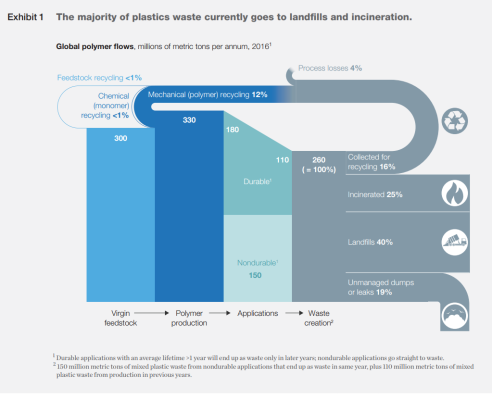Currently, only 12% of plastic waste in the world is reused or recycled. The vast majority of used plastics end up being incinerated, dumped in landfills, or discarded in dumps, leading to a significant loss of valuable resources despite plastics’ high potential for reuse and recycling.
The production of plastics demands substantial capital investment and generates a considerable carbon footprint. Efficient recycling of plastic waste is crucial for transitioning to a circular economy. It helps reduce greenhouse gas emissions by retaining discarded waste within the resource cycle.
Vietnam’s Plastic Pollution Challenge: A Call for Action
Vietnam is the fourth largest contributor to marine plastic pollution globally. In Vietnam, more than 80% of plastic products are currently produced from virgin resins, where 6.9 million tons of virgin resins were used to manufacture plastic products in 2018 alone. On the other hand, the potential to recover raw plastic materials from scrap is high, particularly from domestic solid waste. At a country level, total annual plastic waste generation is estimated to be at least 3.27 million tons, where only about 20% of plastic waste is estimated to be recycled. Meanwhile, about 8-16% of waste that goes into landfill is plastic waste.
Vietnam also increased imports of PE and PET plastics by more than 166% and 137% y-o-y, from January to November 2017, since China’s ban on imported scrap in 2017. By November 2017, it became the largest importer of scrap plastics marked ‘mixed/other’. As a stop-gap measure, the government has tightened restrictions by halting issuance of licenses to import scrap, with a full ban on plastic scrap imports by 2024 and targeting to remove single-use plastic products from urban markets, convenience stores and supermarkets by 2021, with a long-term goal of ending single-use plastics by 2025.
Investments into modernizing and integrating the informal recycling sector will not only increase 6 environmental efficiencies (water, energy) of their processes but reduce leakage of residual plastic waste into the environment. Therefore, if Vietnam is able to develop a viable plastics recycling industry, more plastic waste can be diverted from landfill, monetized, and replace more carbon intensive virgin plastics material.
How Are Plastics Recycled?
Mechanical Recycling:

Mechanical recycling is an established and thriving business in many developed economies, focusing primarily on polyethylene terephthalate (PET), high-density polyethylene (HDPE), and polypropylene. According to projections by McKinsey, the rate of mechanical recycling could increase from 12% of total plastic waste in 2016 to 22% by 2030. This method involves reprocessing plastic waste into new products without altering its chemical structure.
Chemical Recycling:

Chemical recycling is an emerging and scalable approach that covers a variety of technologies, including pyrolysis, gasification, hydro-cracking, and depolymerization. These processes break down the long hydrocarbon chains in plastics into shorter molecules or monomers through chemical, thermal, or catalytic methods. The resulting materials can be used as feedstock for new chemical reactions, producing recycled plastics and other chemicals. Chemical recycling complements mechanical recycling and holds significant potential for the future.
In 2016, the contribution of chemical recycling to total plastic recycling was minimal, accounting for only about 1%. However, by 2030, it is projected to increase significantly, contributing 17% to the total volume of plastic recycling. Research indicates that new chemical recycling technologies will lead the way in innovation and financial viability. Monomer recycling, in particular, can circumvent the need for large capital investments in steam crackers and aromatics plants, as well as the high-cost plants required for producing PET and polyamide intermediates.


Source: MCKINSEY
By integrating these advanced recycling technologies, the plastics industry can move towards a more sustainable and circular economy, effectively minimizing waste and reducing environmental impact.
Bright Capital has established a partnership with the leading pyrolysis recycling company in Australia. If you are interested in exploring investment opportunities in Australia, please don’t hesitate to contact us for more information.
Source of references:
- “IUCN Viet Nam Signs Code of Conduct on Combating Plastic Pollution,” IUCN, January 2019
- Woldemar d’Ambrières, “Plastics Recycling Worldwide: Current Overview and Desirable Changes,” Field Actions Science Reports. The Journal of Field Actions, no. Special Issue 19 (March 1, 2019): 12–21
- Vietnam Business Council for Sustainable Development, United States Business Council for Sustainable Development, and Pathway 21, “Vietnam Materials Marketplace,” June 2019,
- Estimate from year 2010. Hannah Ritchie and Max Roser, “Plastic Pollution,” Our World in Data, September 1, 2018
- Tuoi Tre News, “Vietnam Has Low Plastic Consumption, but Huge Plastic Waste: Association,” May 2019
- Huynh Trung Hai et al., “Circular Economy in Vietnam,” November 2019
- 12 VN Express International, “Vietnam in Danger of Becoming a Dump as China Says No to Trash,” July 17, 2018
- VN Express International. 14 VGP News, “Gov’t Will No Longer Grant Licenses for Waste Imports,” July 2018
- Vietnam Business Council for Sustainable Development, United States Business Council for Sustainable Development, and Pathway 21
- “Vietnam aiming for nationwide eradication of single-use plastics by 2025: PM,” Tuoi Tre News, June 2019
- “Recycling and the Future of the Plastics Industry | McKinsey,” accessed November 17, 2019

NEWSLETTER REGISTER